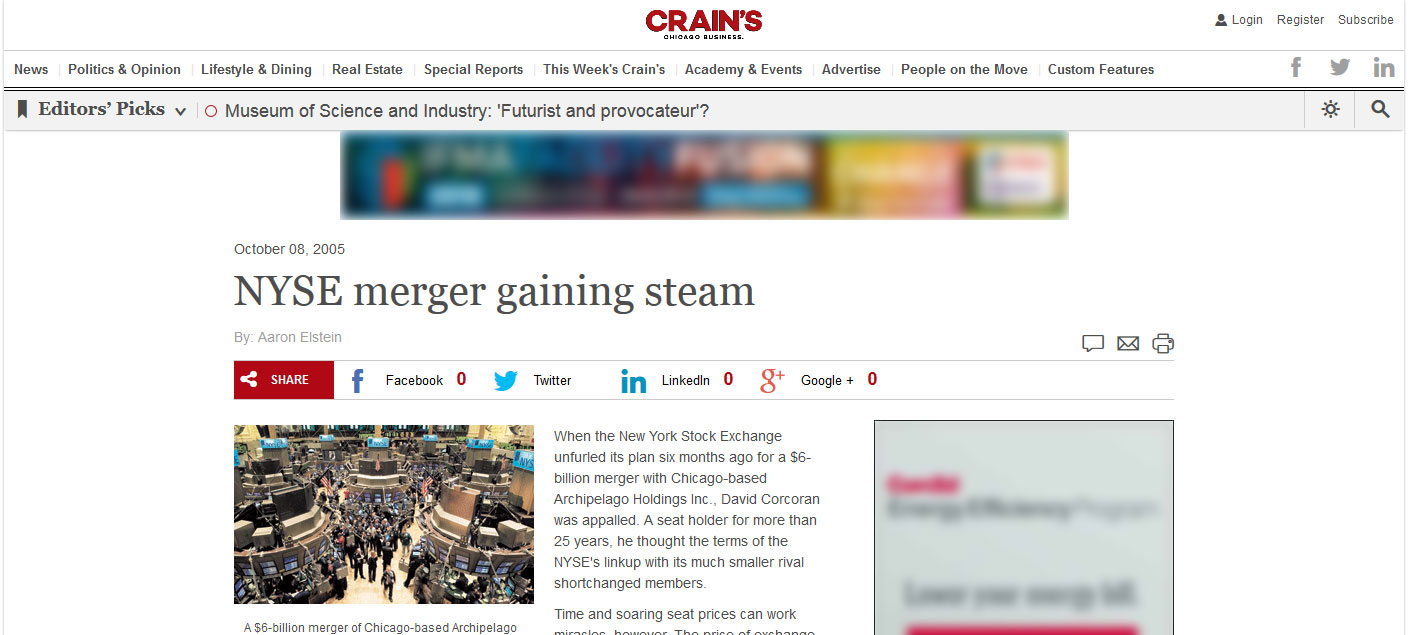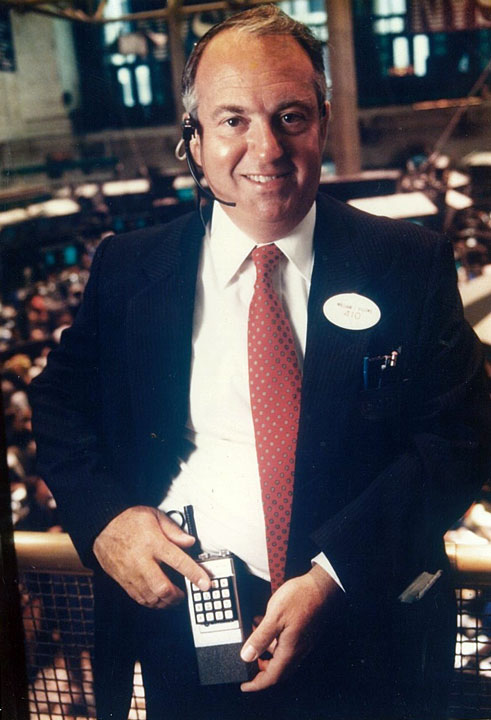A $6-billion merger of Chicago-based Archipelago Holdings Inc. and the New York Stock Exchange looks likely. (image above) Bloomberg News Photo
The biggest remaining obstacle is longtime NYSE member Bill Higgins, who claims to have a bloc of at least 300 members pledged to oppose the transaction. He has sued to block the merger; last week, he filed an amended complaint alleging breach of fiduciary duty and conflicts of interest. Ten members have joined Mr. Higgins' action, including seven who signed on last week. On the other hand, 400 members have petitioned the court in favor of the deal.
When the New York Stock Exchange unfurled its plan six months ago for a $6-billion merger with Chicago-based Archipelago Holdings Inc., David Corcoran was appalled. A seat holder for more than 25 years, he thought the terms of the NYSE's linkup with its much smaller rival shortchanged members.
Time and soaring seat prices can work miracles, however. The price of exchange memberships has nearly doubled since the deal was announced, meaning Mr. Corcoran now stands to pocket $3.6 million in cash and stock for a seat that cost him $190,000.
"I had problems with the deal early on," says Mr. Corcoran, president of discount brokerage firm York Securities Inc. in lower Manhattan. "I still think the merger could have been structured better, but I also think that it takes us in the right direction."
MOMENTUM BUILDS
Though former NYSE director Kenneth Langone last month called for members to vote "no" and a handful of seat holders joined a suit to block the transaction, the merger now looks inevitable. A required two-thirds majority of the exchange's 1,366 seat holders, or members, will likely vote their approval as soon as next month.
ADVERTISING
The momentum is driven by a growing sense that the deal is too good to pass up. Merging with electronic stock exchange Archipelago would instantly recast the 213-year-old NYSE as a technology leader at a time when computers are squeezing out human brokers. The deal would also convert the exchange into a publicly traded company and give it shares that could be used to pay for future acquisitions.
Perhaps most important to NYSE seat holders, the merger promises enormous financial windfalls. Members will pocket $300,000 in cash for each of their seats. Better still, they will jointly end up with a 70% interest in the merged company, a stake that's looking more and more lucrative all the time. Other exchanges that have gone public have seen huge run-ups in their share prices, including Chicago Mercantile Exchange Holdings Inc., whose shares have risen eightfold in the past three years.
SUIT FILED
"It's a brilliant deal," says Frank Christensen, who paid $230,000 for his NYSE seat in 1964. "If nothing changes, we should all line up and vote 'yes.'" Not surprisingly, Chief Executive John Thain wholeheartedly agrees, insisting he will get the votes needed to seal the deal. "Based on the economics, there will be no problem getting twothirds," he says.
The biggest remaining obstacle is longtime NYSE member Bill Higgins, who claims to have a bloc of at least 300 members pledged to oppose the transaction. He has sued to block the merger; last week, he filed an amended complaint alleging breach of fiduciary duty and conflicts of interest. Ten members have joined Mr. Higgins' action, including seven who signed on last week. On the other hand, 400 members have petitioned the court in favor of the deal.
LAST TRAIN LEAVING
In addition, the Securities and Exchange Commission and antitrust authorities must okay the merger before it can be put to a vote with NYSE members. Although antitrust probably isn't an issue, the SEC could extract some expensive concessions. In particular, the agency will want proof that the NYSE will adequately fund its regulatory division.
At this late stage, the NYSE is going to do whatever it must to appease regulators. With rivals such as the Nasdaq Stock Market poised to take advantage of recent regulatory changes favoring their hyperfast electronic trading systems, most members are ready to vote "yes" so they can quickly refocus on defending the NYSE's approximately 80% marketshare, which has been slipping for years.
"The fact is that this is the only deal that is before us and delaying things could hurt the exchange's business," says longtime member James Rothenberg. "There is a sense that this is the last train leaving the station."
Original: NYSE merger gaining steam

